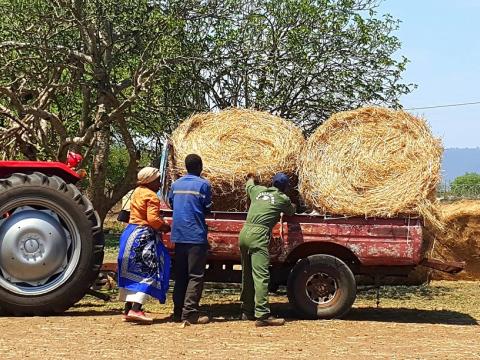60MT of seeds for drought assistance underway for farmers in Swaziland

The distribution of 950 bales of hay and 20.038 metric tons of seeds to farmers in Swaziland’s five constituencies in drought-hit Lubombo region was completed last week. The farmers from Mpolonjeni, Matsanjeni, Somntongo, Sithobela and Shewula received 9.658MT of sorghum seeds, 10.38MT of cowpeas and 950 hay bales.
This was the first distribution for the USAID-funded El Niño Agriculture and Food Security Recovery Project implemented by World Vision and launched recently by the US Ambassador HE Lisa Peterson. The project will deliver 6000 bales of hay for 20,000 cattle and 66MT of seeds as it ends on June 2017.
The distribution of seeds is a once-off exercise led by World Vision, the Ministry of Agriculture and 200-trained lead farmers supporting the beneficiaries as they plant the seeds using conservation agricultural methods. The distribution will continue until all of 6,000 bales were distributed.
The seed selection of sorghum and cowpeas will depend on the threshold of their resistance to dry seasons. “We anticipate that by next harvest season, farmers from these communities will have something to harvest. The seeds selected for their resilience in harsh weather conditions. The farmers were trained on conservation agriculture,” said Ntandoyenkosi Mlangeni, World Vision’s project manager at the briefing in Mpolonjeni prior to the distribution.
At the same meeting, farmer Mphatselwa Mamba expressed concern that the assistance was coming after many of the farmers had already lost their livestock due to the excessive heat and eroded grazing pastures. “Thank you World Vision for the help. I really wish this had come sooner, way before we lost our cattle” he lamented.
Mamba asked how World Vision had ensured that their cattle will not die after eating from the bales. Previously, close to 200 cattle died across the country after eating on a batch of hay imported from a South African Farm.
Mlangeni explained that World Vision made thorough checking to ensure that the bales would not be hazardous to the cattle. This included laboratory tests at the Malkerns Research Centre and University of Swaziland. Portia Magwaza, a woman farmer from eMadadeni, expressed appreciation and anticipation for livestock recovery as the drought had disrupted her livelihood and affected her livestock.
“The drought was very disturbing. I lost a cow and it became difficult even for those remaining to survive. I am hopeful that the bales will reduce the burden and carry us as far as possible”, she said. The beneficiaries were chosen by their respective communities depending on their level of household vulnerability and the priority given to those with 1-10 thriving livestock.



